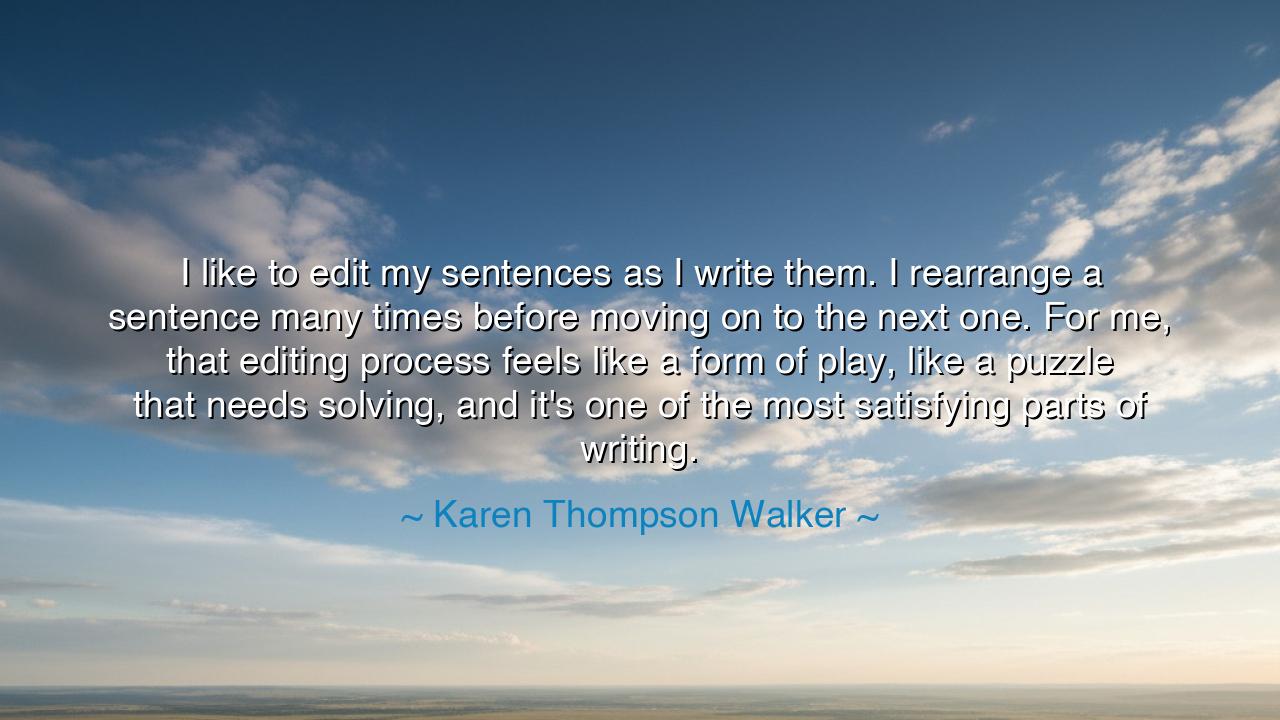
I like to edit my sentences as I write them. I rearrange a
I like to edit my sentences as I write them. I rearrange a sentence many times before moving on to the next one. For me, that editing process feels like a form of play, like a puzzle that needs solving, and it's one of the most satisfying parts of writing.






In the words of Karen Thompson Walker, we are shown the secret joy of the craftsman’s labor: “I like to edit my sentences as I write them. I rearrange a sentence many times before moving on to the next one. For me, that editing process feels like a form of play, like a puzzle that needs solving, and it's one of the most satisfying parts of writing.” Here, writing is not merely the act of expression, but the dance of discovery, the slow shaping of raw thought into polished truth. To edit is not to destroy; it is to refine, to bring forth from rough stone the hidden gem of clarity.
At the heart of this wisdom lies the union of two forces: rigor and play. To edit is the act of discipline, the refusal to leave a thought half-formed or a sentence imperfect. Yet Walker speaks also of play, of joy in the act of rearrangement, of delight in the puzzle of words. In her teaching, discipline and play cease to be enemies; they are woven together. For the greatest art often arises where rigor and joy meet—where labor is also delight, and persistence is also a game.
The ancients themselves honored this process. The philosophers of Greece did not speak their wisdom as it first appeared in their minds. They revised, they tested, they sharpened their words through debate and careful crafting. Plato’s dialogues are not mere records of speech, but carefully composed works in which every phrase is placed with precision. Their writing, like Walker’s, was a puzzle to be solved, a game played with ideas until truth shone brighter.
History, too, gives us examples of writers who understood the satisfaction of endless refinement. Leonardo da Vinci, though known as a painter, filled his notebooks with pages of sentences, sketches, and revisions. He wrote and rewrote, sometimes scribbling the same observation in different forms, as if searching for the arrangement of words that would best capture the soul of the thing. For him, as for Walker, this was not tedium but satisfaction, the joy of solving a puzzle that no one else could quite see.
Her words also carry a deeper meaning for life itself. For is not living, too, an act of constant revision? We rearrange our choices, reframe our memories, and rewrite our paths many times before moving on to the next chapter. Life, like writing, is never perfect in its first draft. To edit one’s steps, to re-shape one’s destiny, is not weakness but wisdom. And if we can treat life as Walker treats her sentences—as a puzzle to be solved, as a form of play—we may find joy even in the labor of becoming.
The lesson, then, is this: cherish the act of refinement. Do not despise the roughness of beginnings, but see them as clay waiting to be shaped. Whether in writing, in art, or in life, approach revision not as burden but as play. Each rearrangement, each attempt to make better, is a movement closer to truth. What seems slow or repetitive is in fact the path of mastery, and mastery itself is always born of patience.
Practically, this means embracing the process of editing—not only on the page, but in all things. When you write, linger with your sentences. When you speak, choose your words with care. When you live, do not be afraid to revisit your choices, to try again, to refine your path. See the puzzle not as a torment, but as a game placed before you by life itself. In this way, the labor of growth becomes joy, and each act of shaping draws you closer to beauty.
So let us remember Karen Thompson Walker’s wisdom: editing is play, and play is satisfaction. In writing, as in life, we are not called to perfection at once, but to the patient shaping of raw beginnings into lasting works. Treat each sentence, each day, as a puzzle worth solving, and in the solving you will find joy. For the work of refinement is not the enemy of creation—it is its truest companion.






AAdministratorAdministrator
Welcome, honored guests. Please leave a comment, we will respond soon